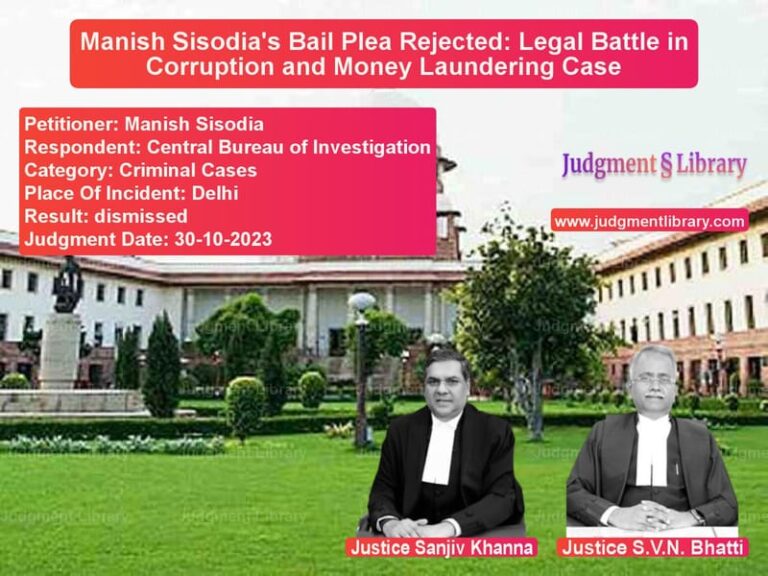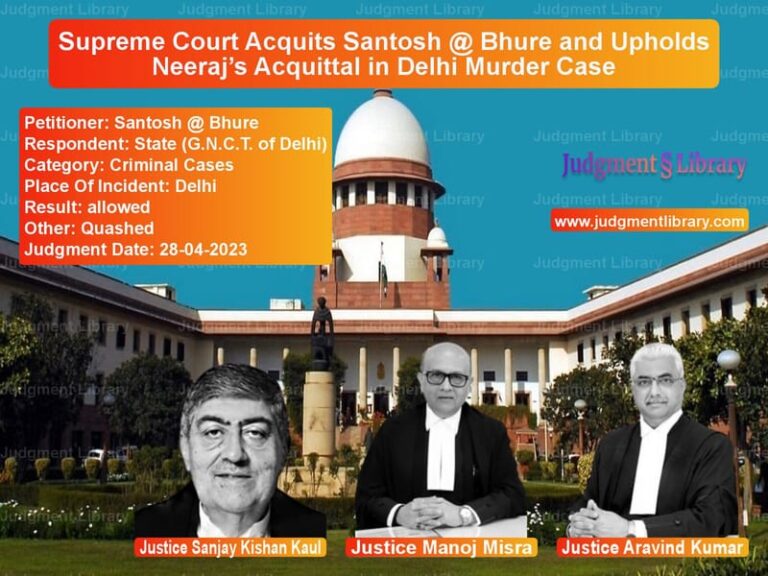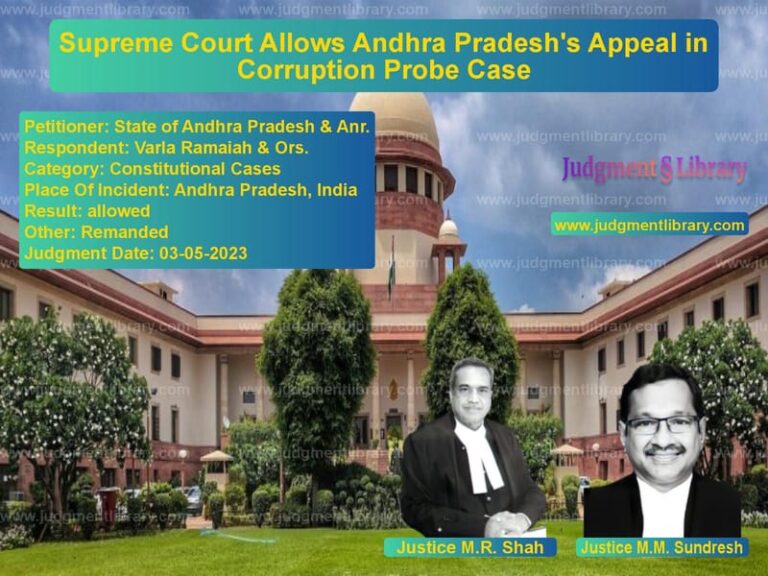BPL Limited v. Deputy Commissioner of Gift Tax – Legal Analysis on Valuation of Gifted Shares Under Gift Tax Act
The case in question involves the valuation of shares gifted by BPL Limited to Celestial Finance Limited in March 1993. The shares in question were of two public limited companies: M/s. BPL Sanyo Technologies Limited and M/s. BPL Sanyo Utilities and Appliances Limited. The gifted shares were under a lock-in period and could not be traded until the completion of that period. The valuation of these shares for the purpose of gift tax became a significant legal issue, particularly when it came to determining their market value for tax purposes under the Gift Tax Act, 1958 (G.T. Act) and the Wealth Tax Act, 1957 (W.T. Act).
The Deputy Commissioner of Gift Tax (the appellant) challenged the valuation approach used in the original assessment. The main issue was how to determine the market value of these gifted shares, especially given that they were under a lock-in period and could not be freely traded on the stock exchange. The case delves into the application of specific rules laid down under the Wealth Tax Act, as well as the Gift Tax Act, to arrive at the correct valuation method for these shares.
Petitioner and Respondent Arguments
Petitioner’s Arguments:
- The petitioner, BPL Limited, argued that the shares were not freely transferable during the lock-in period and thus should not be valued based on their market prices on the stock exchange. BPL contended that the shares were not quoted shares during the lock-in period and should therefore be treated as unquoted shares for the purpose of valuation.
- BPL further argued that the market value of these shares should not be calculated by assuming they were freely transferable. Instead, BPL maintained that the valuation should account for the restrictions imposed by the lock-in period and the inability to sell the shares during that time.
- The petitioner cited the rules under the Wealth Tax Act, particularly Rule 9 and Rule 11 of Schedule III, which deal with the valuation of quoted and unquoted shares, and contended that the shares should be treated in accordance with these rules.
Respondent’s Arguments:
- The respondent, the Deputy Commissioner of Gift Tax, argued that the shares should be valued based on their market price at the time of the transfer. According to the respondent, the fact that the shares were listed on a recognized stock exchange meant that their market value could be easily determined from the available stock quotations.
- The respondent also relied on Rule 21 of Part H of Schedule III of the Wealth Tax Act, arguing that even if the shares were restricted, they should still be valued as though they were freely transferable in the open market. The respondent believed that the restrictions on transfer should not affect the valuation of the shares for gift tax purposes.
Key Issues and Supreme Court’s Ruling
The Supreme Court addressed several key issues in this case:
1. Treatment of Lock-In Shares as Quoted or Unquoted
The main issue was whether the shares should be treated as quoted or unquoted for the purpose of valuation. BPL argued that the shares were not quoted during the lock-in period and therefore should be valued as unquoted shares. The respondent argued that the shares, being listed on a stock exchange, should be valued based on their market price, regardless of the lock-in restrictions.
The Court agreed with the respondent, holding that the shares, despite the lock-in period, were still listed on a recognized stock exchange and were subject to market quotations. The Court explained that the term “quoted shares” refers to shares that are listed on a stock exchange and regularly traded, and that the mere fact that the shares were under a lock-in period did not change their status as quoted shares.
2. Valuation of Shares Under Lock-In Period
The Court examined the valuation of shares during the lock-in period, noting that while the shares could not be freely traded, they were still listed on a recognized stock exchange and had a market value. The Court emphasized that the market value of the shares could be determined from the stock exchange quotations, which reflected the price of the shares as traded in the ordinary course of business.
The Court also clarified that Rule 9 of Part C of Schedule III of the Wealth Tax Act, which deals with the valuation of quoted shares, should apply in this case. The Court held that the shares in question were “quoted shares” and should be valued based on their market price at the time of the gift.
3. Application of Rule 11 for Unquoted Shares
The Court considered whether Rule 11, which applies to the valuation of unquoted shares, should be used in this case. The petitioner had argued that since the shares were under a lock-in period, they should be valued as unquoted shares. However, the Court ruled that Rule 11 was not applicable, as the shares were listed on a recognized stock exchange and thus qualified as quoted shares under Rule 9.
The Court concluded that the valuation of the shares should be determined in accordance with Rule 9 for quoted shares, even though they were under a lock-in period, as the lock-in did not change their status as quoted shares.
Conclusion
The Supreme Court’s judgment in this case has significant implications for the valuation of shares under the Gift Tax Act. The Court ruled that the shares, despite being under a lock-in period, should be treated as quoted shares for the purpose of gift tax valuation. The Court emphasized that the shares were listed on a recognized stock exchange and had a market value, which could be determined from the available stock exchange quotations.
This case clarifies the approach to valuing shares that are subject to restrictions on transfer, particularly in the context of the Wealth Tax Act and Gift Tax Act. The Court’s decision reinforces the principle that shares listed on a stock exchange should be valued based on their market price, even if they are temporarily restricted from being traded.
Impact and Implications
The Court’s ruling provides clarity on the valuation of shares that are under a lock-in period and confirms that such shares should be valued based on their market price, as determined by stock exchange quotations. This decision is significant for tax authorities, as it sets a precedent for the treatment of shares with transfer restrictions in the context of gift tax and wealth tax assessments.
Petitioner Name: Deputy Commissioner of Gift Tax, Central Circle-II.Respondent Name: M/s BPL Limited.Judgment By: Justice Sanjiv Khanna, Justice J.K. Maheshwari.Place Of Incident: New Delhi.Judgment Date: 13-10-2022.
Don’t miss out on the full details! Download the complete judgment in PDF format below and gain valuable insights instantly!
Download Judgment: deputy-commissioner-vs-ms-bpl-limited-supreme-court-of-india-judgment-dated-13-10-2022.pdf
Directly Download Judgment: Directly download this Judgment
See all petitions in Income Tax Disputes
See all petitions in Tax Refund Disputes
See all petitions in Banking Regulations
See all petitions in GST Law
See all petitions in Judgment by Sanjiv Khanna
See all petitions in Judgment by J.K. Maheshwari
See all petitions in dismissed
See all petitions in supreme court of India judgments October 2022
See all petitions in 2022 judgments
See all posts in Taxation and Financial Cases Category
See all allowed petitions in Taxation and Financial Cases Category
See all Dismissed petitions in Taxation and Financial Cases Category
See all partially allowed petitions in Taxation and Financial Cases Category







